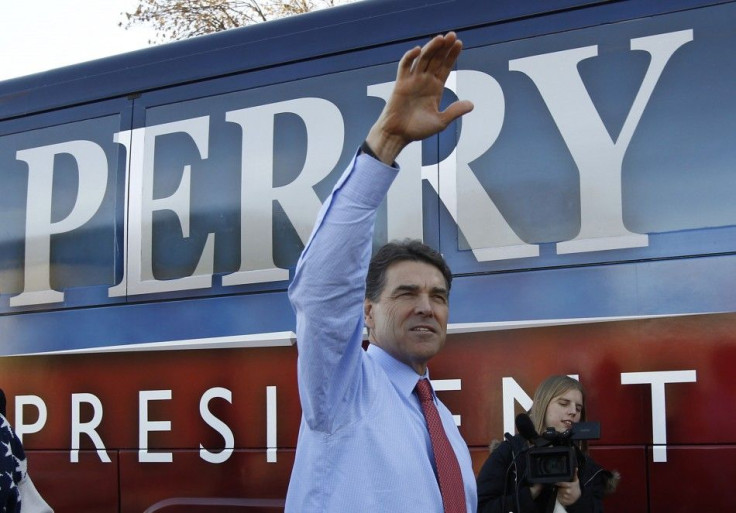Iowa Teen Confronts Rick Perry on 'Don't Ask, Don't Tell'

A high school student confronted Rick Perry at a campaign stop in Iowa about his support for the military's former don't ask, don't tell policy, making Perry the latest Republican candidate to be challenged by a child on a gay-rights issue.
I just want to know why you're so opposed to gays serving openly in the military -- why you want to deny them that freedom when they're fighting and dying for your right to run for president, Rebecka Green, 14, of Decorah, Iowa, said to Perry after a town hall meeting.
Perry told Green, who is bisexual, that his religion made it impossible for him to support gays serving openly in the military.
This is about my faith, he said. I happen to think, you know, there are a whole host of sins, homosexuality being one of them, and I'm a sinner, and so I'm not going to be the first one to throw a stone. I don't agree that openly, gays should be serving in the military. 'Don't ask, don't tell' was working, and ... having them openly serve in the military, I happen to think, as a commander in chief of some 20,000-plus people in the military, is not good public policy.
Perry also got in a dig at President Barack Obama, adding, This president was forced by his base to change that policy, and I don't think it [the repeal] was good policy, and I don't think people in the military thought it was good policy.
Green told reporters afterward that she was not satisfied with Perry's answer.
I'm openly bisexual, and I don't want to be told that if I wanted to serve in the military, that I couldn't, she said. I just think that policy is completely ridiculous, that he thinks that. I just don't like it. Him or nobody should be able to tell somebody who they can or can't love.
Rebecka's father, Todd Green, said he supported his daughter and was disappointed by Perry's response.
For a group of women and men to fight for the freedom to run for president, to gather here peacefully and assemble here peacefully in a place like Decorah, but not for them to have the freedom to be open about who they are, but he can be free to be open about who he is -- to me, it seems to be a major contradiction and very hypocritical, Green, a Democrat and a professor of religion at Luther College, said. He acknowledged being a sinner as well and then labels an entire group of other people sinners, but now he's making a distinction between certain sinners who can't serve openly in the military ... and others who can.
Youths Challenging Candidates
Green is the third child or teen to challenge a presidential candidate on gay rights this month.
On Dec. 1, Jane Schmidt, 16, a high school student in Waverly, Iowa, asked Michele Bachmann what she would do to help protect GSAs in high schools and support the LGBT community, referring to gay-straight alliances and the lesbian, gay, bisexual and transgender community.
Bachmann responded that she believed in equal rights, but that gay people already had equal rights: they could marry a man if they're a woman and marry a woman if they're a man. Legalizing same-sex marriage, she said, would give gay couples special rights.
Just a few days later, Bachmann was confronted again, this time by an 8-year-old boy, Elijah, who approached her at a book signing in South Carolina and whispered, after some coaxing from his mother, My mommy -- Miss Bachmann, my mommy's gay but she doesn't need fixing.
Bachmann stood speechless for a moment before glaring at Elijah's mother and telling the boy, Bye-bye.
Later, she told Glenn Beck that it was wrong for a mother to use her child to promote an agenda, and insisted that she was not homophobic. She also echoed the line she used with Schmidt, telling Beck, They have access to the same laws of marriage, but the restrictions apply to everyone -- you have to marry someone from the opposite sex.
The Supreme Court rejected a version of that argument -- that black and white Americans had equal rights under anti-miscegenation laws because they were all equally entitled to marry someone of the same race and all equally forbidden to marry someone of the opposite race -- in the 1976 Loving v. Virginia case.
© Copyright IBTimes 2024. All rights reserved.





















